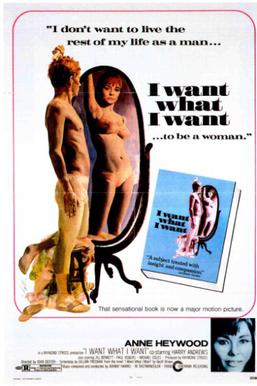Top Qs
Timeline
Chat
Perspective
I Want What I Want (film)
1972 British film by John Dexter From Wikipedia, the free encyclopedia
Remove ads
I Want What I Want is a 1972 British drama film directed by John Dexter and starring Anne Heywood, Harry Andrews and Jill Bennett.[1][2][3][4] It is based on the 1966 novel I Want What I Want by Geoff Brown.[5]
This article has multiple issues. Please help improve it or discuss these issues on the talk page. (Learn how and when to remove these messages)
|
The film was one of several collaborations between producer Raymond Stross and his wife actress Anne Heywood.[6]
Remove ads
Cast
- Anne Heywood as Roy / Wendy
- Harry Andrews as Roy's father
- Jill Bennett as Margaret Stevenson
- Paul Rogers as Mr. Waites
- Michael Coles as Frank
- Sheila Reid as June
- Virginia Stride as Shirley
- Jill Melford as Lorna
- Philip Bond as Philip
- Rachel Gurney as Mrs. Parkhurst
- Robin Hawdon as Tony
- Anthony Sharp as Mr. Parkhurst
Critical reception
Summarize
Perspective
The Monthly Film Bulletin wrote: "Tasteless and exploitative for all its earnest production notes ("The transexual, latent or developed, may be more prevalent in modern society than is generally realised"), I Want What I Want is likely to cause as much distaste as that other controversial film about an 'abnormal' minority, Roy Boulting's Twisted Nerve. This time the problem area is transexuals rather than mongols, but the treatment is no less crudely misleading. As Gillian Freeman's script piles enormity on enormity, from parental renunciation to traumatic frigidity to attempted rape to self-castration, the film's few attempts at 'seriousness' (typified by Paul Rogers' kindly doctor, who assures Wendy that she can have an operation although she will never actually look like a woman) seem perfunctory sops to its conscience. Anne Heywood struggles manfully (?) with her dual role as Roy and Wendy, and John Dexter's direction has some Sirk-like moments of high-gloss emotionalism that would be quite fetching in any other context. But the conclusions to which the audience is led by the film's relentless melodramatics are likely to increase rather than diminish its fear of a misunderstood minority."[7]
Remove ads
References
External links
Wikiwand - on
Seamless Wikipedia browsing. On steroids.
Remove ads

